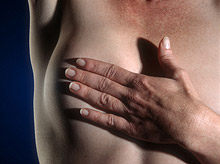Dr Karin Baatjes (Specialist Surgeon) and Professor Apffelstaed Associate Professor-University of Stellenbosch and Head: Breast Clinic, Tygerberg Hospital) put together some basic facts every woman should know.
Women who are considered as ‘young’ when it comes to breast cancer are commonly defined as women younger than 35 years of age - and 6% of all breast cancer occurs in women under the age of 40.
While the cause for this alarming trend remains unknown, it may be due to underlying genetic or lifestyle factors. Obesity, a sedentary lifestyle, smoking and drinking, environmental factors and fertility treatments are associated, as well as commencing menstruation early, before age nine, and falling pregnant for the first time after 30 years.
Positive diagnosis – now what?
On diagnosis of breast cancer in a younger woman, there are various issues and controversies in the diagnosis and treatment involving the impact of the treatment on body image, sexuality, fertility, premature menopause, as well as pregnancy.
Another problem is that younger women tend to have dense breasts and, combined with cyclical hormonal changes in the breast tissue, this makes clinical examination more difficult.
The accuracy of mammography is also lower in young women than in older women due to the increased density in the young group. Screening mammography is not recommended for young women, the consequence of this being that they present more often with palpable disease, rather than with a mammographically detected abnormality.
This is one of the primary reasons it’s paramount that a young woman should have any lump fully investigated. Clinical examination along with imaging of the lesion is compulsory.
Dense breasts can also be a problem when it comes to a mammography as they can obscure small lesions. In this instance a full field digital mammography can help.
The addition of good ultrasound of the breast in conjunction with fine needle aspiration or core needle biopsy of the lump assures a complete examination. A cytological and/or histological diagnosis has to be established before designating a lump as benign.
Treatment complications
Apart from the immediate management of the breast cancer which includes a combination of surgery, radiotherapy, chemotherapy, hormonal therapy and biological treatment, the following issues also come into play:
- Fertility
Current breast cancer drugs (such as chemotherapy) can make some women infertile, and while this may not be an issue for women who are beyond child-bearing age or who already have children, for those still hoping to start a family, it can be devastating.
This is why the doctors advise you discuss the impact of the treatment before it is commenced, as the response of each patient is different - and so is the effect of the drugs on fertility. - Lack of age appropriate treatments
Breast cancer in younger women can be more aggressive than in older women, and treatments are not designed for them. Therefore, in addition to surgery they often also need chemotherapy.
Hormonal therapy regimes also differ as ovarian health has to be taken into consideration. - Work and career paths
Prolonged treatment regimes can impinge on the work and/or daily functioning of a young woman who is still active in the mainstream market place. Special consideration needs to be given to these women regarding prolonged sick leave etc.
According to the experts, these are all valid reason why these women be treated in a dedicated breast unit by a multi-disciplinary team that can address the issues in an individualised fashion in this subset of patients afflicted by breast cancer.
Healthy breast management by age
It’s important to look after your breasts at every age, but here the doctors give a breakdown of what you should be doing at each stage of your life in order to keep your breasts healthy and spot anything out of the ordinary in time.
Age 20-39:
- Monthly breast examination
- Clinical breast examination by a healthcare professional every three years
Age 40 and over:
- Monthly breast examination
- Annual clinical breast examination by a healthcare professional
- Annual mammography
Lifestyle do’s and don’ts
- Don’t eat too many saturated fats. Avoid anything fried, including junk food.
- Do go green. Stock up on fresh fruit and vegetables.
- Do watch your weight. Increased body fat is linked to a raise in oestrogen level.
- Don’t drink more than two alcoholic drinks per day.
- Do exercise more to decrease your breast cancer risk by 30%.
Reference: Dr Karin Baatjes, Specialist Surgeon and Professor Apffelstaedt, Associate Professor-University of Stellenbosch and Head: Breast Clinic, Tygerberg Hospital
(Health24, October 2009)




 Publications
Publications
 Partners
Partners













